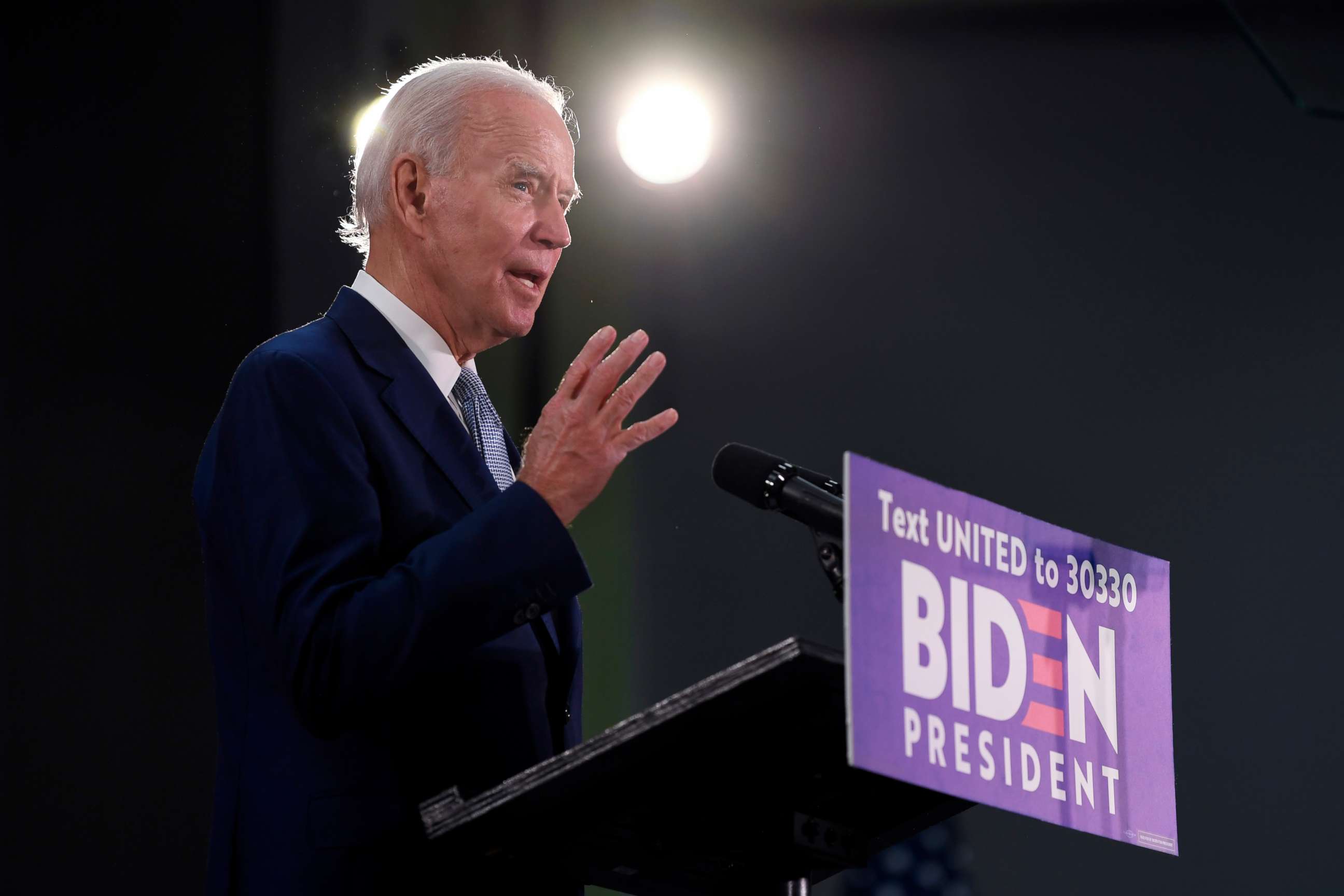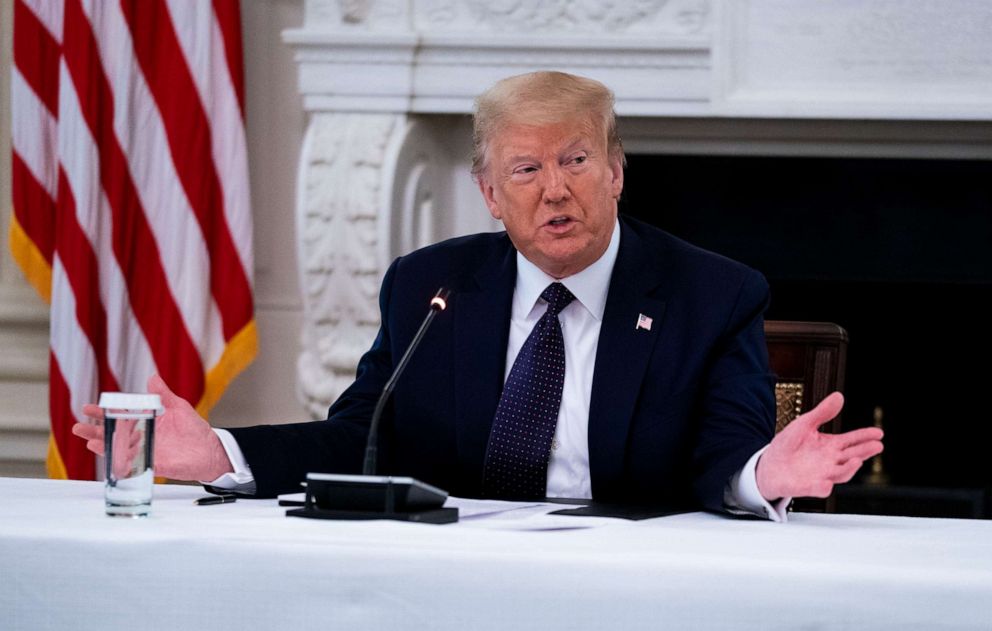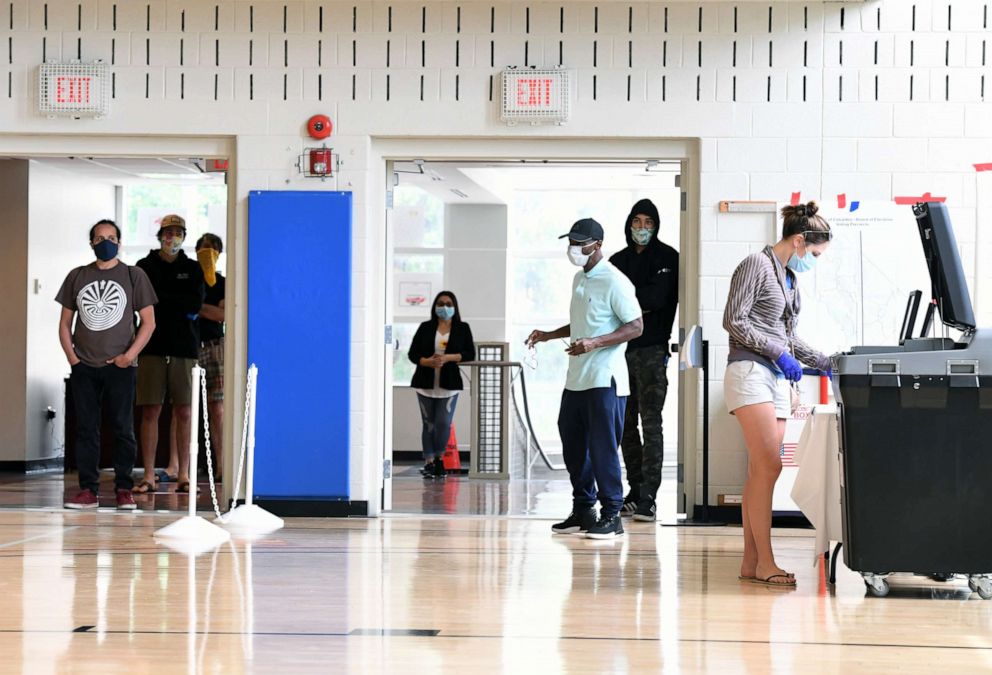The Note: Leadership challenge for Biden on day marked by mourning
As the nation tunes in for a funeral, empathy is key to the Biden brand.
The TAKE with Rick Klein
Does the presumptive nominee of the Democratic Party get to lead the party now? What about a movement that may not be looking to be led?
George Floyd's funeral will be a national moment that former Vice President Joe Biden will play just a small role in, having chosen to meet with the family privately on Monday and send a video message to be played during services in Houston on Tuesday.
Biden will seek to play a larger part in corralling a debate he didn't start and can't necessarily control, when it comes to policy components that are growing out of Floyd's death. Addressing one slogan that's caught on, Biden's campaign made clear Monday that the former vice president "does not believe that police should be defunded."
But "Defund the Police" carries more depth and meaning than the simple words suggest, even as President Donald Trump seeks to weaponize those words and tag all Democrats with the label. Cities from Los Angeles to Minneapolis to New York are already grappling with what it means in budgetary ways -- to quote a Bidenism, ways that "tell you what you value."

As the nation tunes in for a funeral, empathy is key to the Biden brand. This would appear to be a moment begging for that and more, judging from scenes on the streets and polling that casts this as larger than police tactics and mistreatment of minorities.
"It's hard enough to grieve, but it's much harder to do it in public," Biden told CBS News on Monday, after meeting with Floyd's family. "It's much harder with the whole world watching you."
If this marks a new national movement, as some have suggested, it won't be easy to lead. Biden has a particular goal -- winning the election -- that won't neatly align with the goals of the people who have taken to the streets.
The RUNDOWN with MaryAlice Parks
The recent protests against police brutality as well as the coronavirus pandemic both have the potential to dramatically shift the national debate around government budgets at all levels.
Not only have we seen commitments to repurpose funding away from police departments in California and Minneapolis, but the headline this week that nearly 600 front-line health care workers appeared to have died of COVID-19 in the U.S. could impact thinking as well.

That number includes doctors, nurses and paramedics, as well as other support staff such as "hospital janitors, administrators and nursing home workers," according to Kaiser Health News and the team that compiled the data for a project, Lost on the Frontline, organized by The Guardian and KHN.
Fresh on the minds of all Americans are those stories from this spring about health care workers struggling with personal protective gear supplies and who were forced, especially in major cities, to reuse masks and other supplies.
Once the political crossfire slows and the process of putting pen to paper on budgets gets underway it could be hard for politicians to argue for a status quo when the ground beneath them has shifted so dramatically this year.
The TIP with Quinn Scanlan
The Georgia secretary of state's office is already calling Tuesday's primary election -- postponed twice because of the coronavirus -- a success. More than 1.6 million voters were approved to cast their ballots absentee, and as of Sunday night, more than 940,000 voters had returned their ballots, a more than 2,500% increase compared to the state's 2016 presidential primary.
"The numbers stand on their own. We have had a successful election," deputy Secretary of State Jordan Fuchs told ABC News on Monday. "This is a massive amount of turnout in the middle of a pandemic. So, you know, if the goal was to get people to vote, we have far surpassed any goal that we probably had internally."

But election officials in Fulton County, the state's largest county and home to much of its capital, Atlanta, faced "a lot of difficulty" with electronic absentee applications, Richard Barron, the director of the county's Department of Registration and Elections, said in mid-May, citing technical hurdles to processing more than 25,000 emailed applications. Aaron Johnson, a county board of elections member, told ABC News on Monday that the "backlog" had been addressed and all applications have been processed -- but that doesn't necessarily mean all those ballots will get to voters in time to mail them back, or even drop them in one of the 20 secure drop boxes in the county by the time polls close Tuesday.
Senate candidate Jon Ossoff, who is competing against six others hoping to be the Democrat facing Sen. David Perdue in November, and his wife were two voters who applied for absentee ballots via email in early May, but as of Monday, had still never received them. They both opted to vote early in person Friday, the last day to do so, and waited in line for four hours before they were able to cast their ballots.
BRINGING AMERICA BACK
According to new research, COVID-19 was likely brought to the U.S. by travelers from Wuhan long before it was detected, according to former acting Homeland Security Undersecretary and ABC News contributor John Cohen. Read this story and more by checking out Bringing America Back, an ABC News feature that highlights the day's top stories in economic recovery and medical preparedness amid the coronavirus pandemic.
THE PLAYLIST
ABC News' "Start Here" Podcast. Tuesday morning's episode features ABC News' Alex Perez and ABC News contributor Brad Garrett who talk about what happens when calls to "defund the police" meet political realities. ABC News Chief Business and Economics correspondent Rebecca Jarvis tells us what to make of new findings that the U.S. officially entered a recession in February. Then, ABC News contributor Dr. John Brownstein talks about the study he led for Harvard Medical School which found dramatic spikes in auto traffic around Wuhan hospitals month before China reported the coronavirus outbreak to the world. http://apple.co/2HPocUL
WHAT YOU NEED TO KNOW TODAY
Download the ABC News app and select "The Note" as an item of interest to receive the day's sharpest political analysis.
The Note is a daily ABC News feature that highlights the key political moments of the day ahead. Please check back tomorrow for the latest.




